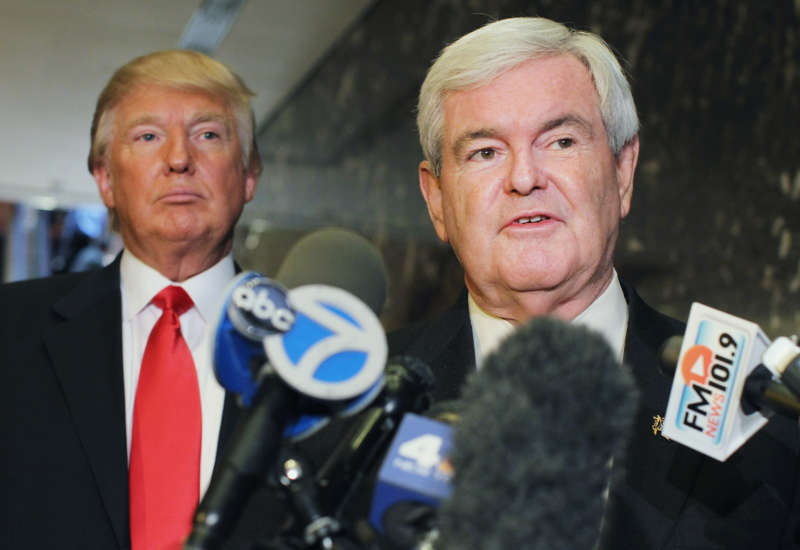Former President Donald Trump is teaming up with former Speaker of the House Newt Gingrich to craft a new document that they intend to be a blueprint for helping Republicans win control of Congress in the 2022 midterm elections.
The document, which is still in its beginning phases, would be modeled on Gingrich’s 1994 “Contract with America,” a series of conservative promises and reform ideas that helped him and Republicans win control of both houses of Congress in the midterm races during former President Bill Clinton’s first term in office. The document would be updated to reflect Trump’s MAGA and “America First” philosophies, those with knowledge of it said.
Along with Gingrich, Trump has met with his former chief of staff Mark Meadows and Sen. Lindsey Graham (R-South Carolina) at his Mar-a-Lago estate in Florida to discuss the formation of this new “Contract with America,” Politico reported. Sources with knowledge of the proposal told the publication that the document will become “a policy priority for 2022 and beyond” for the Republican Party.
Gingrich, acknowledging the document won’t be published “anytime soon,” said that it would be a “positive” message for the Republican Party to campaign on. But in the same statement to Politico, Gingrich also suggested that the document would be attacking attempts to promote racial equality in the United States.
“School choice, teaching American history for real, abolishing the ‘1619 Project,’ eliminating critical race theory and what the Texas legislature is doing,” Gingrich said regarding what might be included. “We should say, ‘Bring it on.’”
Those stated goals don’t sound like a positive message at all, noted Washington Post journalist Dave Weigel.
“Gingrich says a MAGA contract should be ‘positive’ and then lists one thing it will be for and three things it will be against,” Weigel noted on Twitter.
Many on the right have made similar attacks on ideas about how to better teach history in a more inclusive way. The “1619 Project” has come under particular fire from the right wing and white supremacists for its attempt to introduce a more in-depth examination of the history of slavery and racism in the U.S. to classrooms across the country.
Trump himself rejected those efforts while serving as president, and even tried to promote his own “1776 Commission” (a direct response to the 1619 Project), which he described as a “patriotic” history lesson. With several key aspects left out of the narrative, that project was clearly an attempt to sugar-coat much of U.S. history and it was telling that no professional historians were involved in its writing. Indeed, many historians blasted the 1776 Commission as lacking evidence in its claims and for taking quotations from historical figures out of context.
Attacks on Critical Race Theory (CRT) are similarly based on the right’s misinterpretation of what it is truly about, said Mari Matsuda, a legal scholar and one of the founding voices of CRT, in an interview with Truthout last year.
“The goal of critical race theory is not to make white people feel guilty, oppressed, disregarded or disrespected” as some conservatives have wrongly suggested, Matsuda said. “Nothing in my work does that. The stated goal of critical race theory is, first, to understand the concept of race: How was race as an idea developed and deployed? Second, CRT seeks to dismantle racism as part of a project of dismantling all forms of oppression.”
While the new Contract with America that Trump and Gingrich are developing hopes to repeat the outcomes of the 1994 midterm elections, it’s possible that promoting MAGA-esque ideals and attaching them to Republicans running in 2022 could have a detrimental effect on the party’s prospects and could backfire on both the former president and the former speaker.
Efforts to repeat the electoral successes of the original Contract with America made by Gingrich in 2011 to revive his fledgling presidential campaign bid failed spectacularly and Gingrich ended up dropping out of the race in April 2012 after losing to Mitt Romney (now a senator from Utah).
Trump also tried to make his own “Contract with the American Voter” in 2016, laying out ideas for what his administration would try to accomplish should he win. While Trump did end up winning the Electoral College, he failed to win a majority of voters in the popular vote totals, and most of the policies he promoted never came to fruition.
It’s unclear what Trump’s impact on the 2022 midterms will be — if the message in the new “Contract with America” is publicly perceived as positive, it will likely benefit Republicans and in turn be helpful for Trump in promoting himself as the GOP’s candidate for president in 2024. However, if it contains mostly negative and erroneous messages, such as Trump’s false claims about his electoral loss to Joe Biden in 2020, it could wind up producing a negative effect for him and the party.


